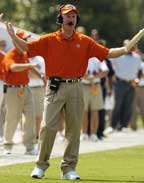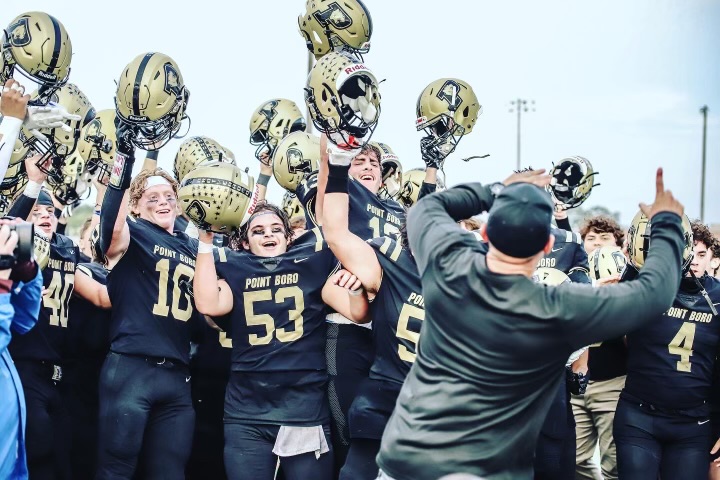On the War (Eagle) Path
Auburn coach Tommy Tuberville has every right to be mad after his program was denied a shot at its first national title. Instead, he’s focused on guiding the Tigers to the BCS Championship Game and leaving no doubts.
 |
| Todd J. Van Emst, Auburn University |
COACH: You grew up in Camden, AR, and attended Harmony Grove H.S. What sports did you excel in as a kid?
TUBERVILLE: I grew up long before Game Boys and PlayStations, so I played every sport – basketball, baseball. We didn’t have a football team at school until seventh grade. We were basically a basketball school. I was a pretty good player, but once we started football, I kind of dropped everything else, including baseball.We lived in the country, and I always looked forward to having friends over to play with as a youngster. I spent a lot of time at the Boys Club in downtown Camden, where everyone met up during the summertime. I grew up in a family that loved to hunt and fish. I had an older brother and sister so I was kind of the baby of the family and the only sibling really involved in athletics.
COACH: What did you learn about yourself as the head coach at Hermitage (AR) H.S.?
TUBERVILLE: When I enrolled at Southern Arkansas University (where I played football) my ambition was to find a trade in the business world. I kept in touch with my old high school coach, Butch Stoker. Hermitage High was only about 40 miles away, and I followed all of its teams. As I plowed through college, I dropped the idea of business and decided to become a coach.
My college football coaches, Rip Powell and Sonny Whittington, taught me all I had to know about the fundamentals of the game. You think you know a lot about football when you’re playing the game in high school. But it’s not until you get to college that you realize how much more you have to learn. So I wound up getting my degree in physical education – and my first job was at Hermitage H.S. You could call it “jobs.”
I was an assistant senior and head junior high football coach and junior high girl’s basketball coach, plus teaching three physics classes. It was only the second year of the school’s football program. It was very interesting because I had to teach football to the school kids and the community.
Since Hermitage was more of a basketball-oriented school, everyone had to be educated about football. We went around to the booster club groups and talked about the sport and what they could look forward to on Friday nights.
I became the head football coach in my third season. That was a lot of responsibility for a young person. But I really enjoyed it. The community embraced me and we had a successful season and beat our cross-town rivals for the first time.
COACH: You were a free safety at Southern Arkansas U. What kind of player were you?
TUBERVILLE: Not very good. I was slow. One reason I played college football was because I knew if I ever was going to coach in college I’d have to know how to play it and coach it.
So I pushed myself. At spring practice or regular practice or winter conditioning, I’d find myself thinking, ‘What am I doing out here?’ But it paid off for me. I had some great coaches who believed in attitude and character.
A great player I was not, but I was a guy who really enjoyed being out there and who learned a lot from college athletics. I wouldn’t have traded it for anything.
COACH: How advantageous was it to have had a father, Charles, who was a high school basketball and football official and helped you understand all of the rules?
TUBERVILLE: It helped immeasurably. I would sit around and listen to his meetings before and after games. I accompanied him for his summer meetings and the training of new officials.
When I was younger I didn’t know that much about football other than what I picked up from my dad. It was an educational experience. I’m probably more lenient with officials now because I understand what they go through and how much time and effort go into the making of an official, with very little in return.
COACH: In 2004, you guided Auburn to its best season ever, highlighted by a 13-0 record. That was Auburn’s first conference title since 1989, and its first outright championship, culminating with a victory in the Sugar Bowl.
Yet, you were slighted for national championship honors. That said, what are your views on the current BCS system and what can be done to fix it?
TUBERVILLE: We’ve always wanted a system that could come as close as possible to picking a national championship team without having a playoff. We all understand how difficult playoffs can be, how tough it is to pick the teams, and the drain on the players to continue to play games.
If anybody has a gripe about how the entire system works, it would probably be Auburn because of the situation that happened to us last year. I understood. But it was hard to explain to your team and your fans why we weren’t playing in the Orange Bowl. But, again you have that system and until you change it – find the extra game or use an eight-team playoff –there’s no reason to complain. We all understand the system going in. I am sure USC was just as disappointed the year before when it didn’t get to go to the championship game.
COACH: You clearly have built a program at Auburn that excels on the field. But what other values have you instilled in your players to make them winners away from the field – prepare them for life after football?
TUBERVILLE: The biggest thing we want our players to understand when they come to Auburn is that they are inheriting an environment in which they can grow and mature as young adults. They will be out on their own for the first time and forced to make their own decisions.
Luckily, we have a close-knit coaching staff to help them with their transition. We have a team chaplain, Chett Williams, who is very instrumental in what we do. He played football at Auburn, and is only in his late 30’s, and can easily relate to the players. He’s been through it and understands what we do at Auburn and how we relate to young college guys.
Chett’s a guy they can lean on. We really preach attitude and character.
Obviously, you need good upperclassmen players. If you look at last season, we had several seniors who went in the first round of the NFL Draft. Those are great role models.
COACH: You were an eight-year member of the University of Miami staff, serving under Jimmy Johnson and Dennis Erickson, and taking over as the Hurricanes defensive coordinator in 1993. You then assumed the dual role of linebackers coach/defensive coordinator at Texas A&M, directing the Aggies to a #4 national ranking in scoring defense. What is your defensive philosophy and who was your influence?
TUBERVILLE: The first guy in college that I ever started working with was Sonny Whittington, my defensive coordinator/secondary coach at Southern Arkansas. That was the first time I was ever around fundamentals and technique, and really learning a lot about football.
I was also very fortunate in my first college job as a graduate assistant at Arkansas State. I worked under Larry Lacewell, former director of pro and college scouting for the Dallas Cowboys.
He had been Barry Switzer’s defensive coordinator at Oklahoma and I learned most of my defensive philosophy from him – being able to play fundamental techniques and do the little things right.
Of course, I also had the luxury of working under Jimmy Johnson, a great defensive guy, and then R.C. Slocum.
I built my own philosophy of coaching defense and knowing, as a head coach, that you have to play good defense to win consistently. That’s what we do at Auburn. We emphasize a lot of speed and quickness and we pressure people a lot.
We also teach the fundamentals, the small things like how to use your hands, how to get off blocks, and we stress turnovers a lot – how to create them.
COACH: What kind of defense do you employ at Auburn?
TUBERVILLE: We play out of an even front defense, which is a four-man front. But we’re mostly a multiple defensive front. What we try to do is emphasize technique.
We’re not a big blitzing team. We probably pressure the offense 25 percent of the time. I believe in putting guys on the field with a lot of speed and
physical ability. Speed and quickness usually wins out for you on defense.
COACH: What are the keys to game planning and strategizing and breaking down an opponent’s offense?
TUBERVILLE: We look to defend their better players. We will recognize their strengths on offense, which might be a running back or a wide receiver. It might be their quarterback, whether he can run or throw. So our goal is to shut down what they do best.
And by running multiple defenses, we can do that. We’re not going to run a whole lot of things. We try to keep it simple and basic. We try not to change a whole lot each week, but to have enough in our package to make some changes.
COACH: What kind of offensive system do you run?
TUBERVILLE: We run the West Coast offense – short passing game. Last year we ran the ball about 60 percent of the time and threw about 40, which is about right.
We want to be more of a run-oriented team and control the ball on offense. But if people try to shut us down on the ground, we want to be able to throw the ball down the field. Last year we were successful at both.
COACH: Prior to coaching at Auburn, you were the head coach at the University of Mississippi from 1995-98. How did that experience help you prepare for the Auburn job and the rigors of playing in the rugged SEC?
TUBERVILLE: I don’t think you can ever gain enough experience as an assistant coach to become a head coach for the first time. Climbing the ranks and having coordinators jobs like I did gives you experience to some extent, but when I took over at Ole Miss, it was an entirely different experience.
Because now, instead of being in charge of 15 or 20 players on one side of the football, or maybe 30 if you’re a coordinator, you all of sudden become responsible for all of the players and all of the coaches, trainers, and managers.
The ball is in your court, so to speak. Everything begins and ends with you. And you don’t get to coach nearly as much when you become a head coach because you are more hands on in all aspects of your team.
Ole Miss was a great experience. It’s a great place and we had a lot of fun. We inherited a program with only 61 scholarships, three years probation, no TV or bowl games. And we were able to overcome a lot of things and win a lot of games because of the support of the university and the fans. You need the support of people in tough situations. We were successful almost every year we were there.
COACH: How has the role of a head coach in college football changed? What have you done specifically to keep pace?
TUBERVILLE: Every job changes. But the only thing that really changes in college is the players. Sometimes you have different kinds of players that you can bring in to change a little bit of your philosophy.
Coaching hasn’t changed a whole lot. The basics are still blocking and tackling, teaching fundamentals, and recruiting.
The biggest thing that has probably changed is the media over the last six or seven years, because of the Internet and all the sports radio talk shows.
There’s a lot of information out there that was never before available to the public. And I’m not talking about the bad stuff. I’m talking about the rumors and recruiting services and all of those things that you never really had to deal with.
COACH: What aspect of coaching do you enjoy the most and why: recruiting, practice, game preparation, or in-game decision making?
TUBERVILLE: I kind of like it all. Everybody loves the game-time situation-making decisions. I enjoy the recruiting. I enjoy the alumni. I enjoy most aspects of it. But the thing that gives me the most joy is dealing with the young guys and watching them improve and be successful.
COACH: In your opinion, what is the greatest thing you have learned about yourself while shaping and coaching young men?
TUBERVILLE: I’ve learned patience. When you’re young, you get into this job and you think you can change the coaching profession in one day. You really need a lot of patience to deal with everyone involved in your program – players, assistant coaches, alumni, and media.
If you can maintain your patience I think you can be successful.





